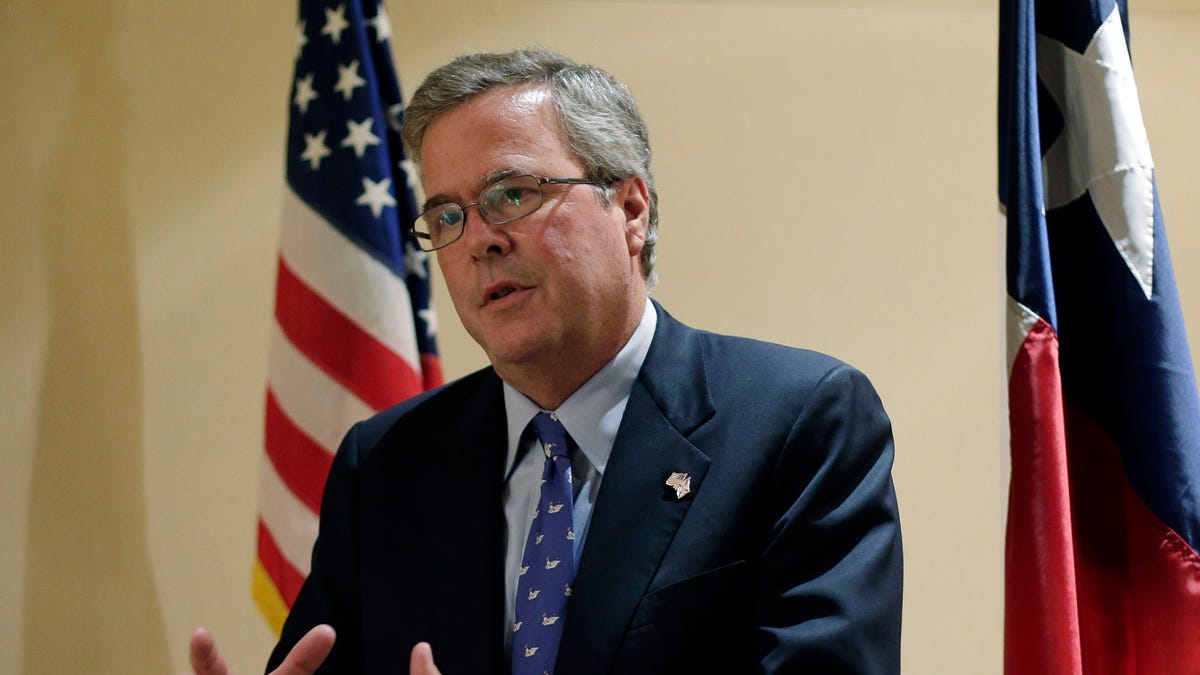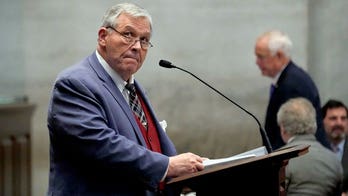
FILE: Feb. 26, 2013: Former Florida Gov. Jeb Bush, R, at a Texas Business Leadership Council event, Austin, Texas. (AP)
Also...
David Gregory on the couch
Jeb’s Payday Paradox: Can he afford to run for the presidency?
There’s a new question about Jeb Bush and 2016: Is he prepared to make the financial sacrifice involved in running for the presidency?
The former Florida governor is making big bucks running what might be called Jeb Inc., and he’d have to walk away from that for the uncertainty of an arduous campaign.
That’s my takeaway from a New York Times piece on Bush’s private-sector moneymaking. Leaving aside the media scrutiny of his ventures and the potential political impact, could Jeb decide that it’s just not worth it?
Governors and senators don’t face this kind of dilemma. Mike Huckabee has said that a reluctance to give up his income from Fox News and elsewhere was a factor in his passing on the 2012 race and could influence him again.
If Jeb Bush is already ambivalent about running—and he had to be struck by conservative criticism of his describing illegal immigration as an “act of love”—his financial situation may loom large.
People think of the Bushes as rich, but the Times says Jeb left office in 2007 determined to increase his net worth of $1.3 million:
“As he explores a White House bid, friends said, Mr. Bush’s lucrative career is an unspoken but potent factor in his decision making. Entering the 2016 Republican field would inevitably require dismantling the business empire that he has assembled — an empire that now employs his son Jeb Bush Jr.”
He’s earned more than $3 million in board fees and stock grants from public companies and gives speeches at $50,000 a pop.
Politicians with little or no business experience are regularly accused of not knowing how the real world works. But pols who plunge into business are invariably tied to controversial clients and ventures. There is no greater example than Mitt Romney, whose tenure at Bain Capital was thoroughly picked apart by the Obama campaign.
You can easily imagine the 30-second ad on this one: Bush was a director of a company called InnoVida that “ had faked documents, lied about the health of the business and misappropriated $40 million in company funds, records show. The company went bankrupt in 2011, its founder eventually went to jail and investors lost nearly all of their money.” Ouch.
Bush was also involved in the effort to save Lehman Brothers, which fairly or unfairly ties him to the Wall Street meltdown that triggered the 2008 financial crisis.
And he’s a director of Tenet Health Care, which supported ObamaCare and urged people to sign up under the law.
Is it unfair for the Times to unearth all this at such an early stage? It’s actually a sneak preview of what Bush can expect from the press if he runs. And you can be sure any Democratic opponent will be vacuuming up every available scrap of his business record for future attacks.
Still, the overriding question for Jeb, giving the bruising nature of today’s campaigns: Does he want to give up the dough?
David Gregory on the couch
Talk about burying the lead.
In a Washington Post piece about “Meet the Press” languishing in third place, there was this deep in the story:
“Last year, the network undertook an unusual assessment of the 43-year-old journalist, commissioning a psychological consultant to interview his friends and even his wife. The idea, according to a network spokeswoman, Meghan Pianta, was “to get perspective and insight from people who know him best.” But the research project struck some at NBC as odd, given that Gregory has been employed there for nearly 20 years.”
Which, of course, everyone else immediately led with.
An NBC spokeswoman later told Politico it had been a “brand consultant,” but author Paul Farhi says he checked twice with the network.
Gregory knows he can never replace the late Tim Russert, but six years after Russert’s death, the once-dominant show is running behind Bob Schieffer’s “Face the Nation” and “This Week” with sometimes Stephanopoulos.
“I’m not just trying to sell you — well, I am trying to sell you — but I’m not going to B.S. you, either. Yeah, it’s hard. I see what our challenges are. But we’re going to fix our problems,” Gregory is quoted as saying.
The fixes include shorter interviews, faster-paced segments and a broader range of topics.
But the real mystery is: What did the psychological/brand consultant conclude about David Gregory?




